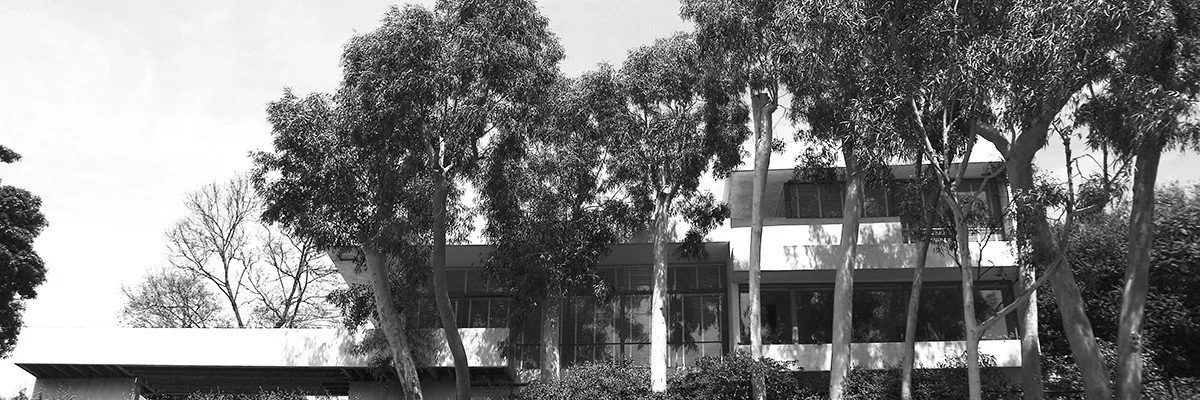The MAK Center presented a new work by composer Scott Benzel: Op. 21: Inner Experience Fellowship/Friends of Crime prepared for piano, vintage electronics, guitar, experimental percussion, tape loop, gong, and central mixing station. The one-day only, 9-hour performance took place at the Schindler-designed Fitzpatrick-Leland House.
Designed to provide an enveloping experience for the visitor, the performance was composed of simultaneous elements issuing from every part of the house and grounds. Moving individually and at will through the property, each listener’s experience was unique.
Inspired by literary theorist Roland Barthes’s text Sade Fourier Loyola (1971), Benzel is fascinated by the methodology for creating philosophical languages identified in the works of the famed libertine, utopian, and saint. Benzel sees this same practice of self-isolation, articulation and ordering as part of a time-honored Los Angeles tradition in which a group holes up in a house to order their “exercises, séances” and sound. In Op. 21, the Fitzpatrick-Leland house became both incubator and generator of an immersive soundwork.
The composition was durational and environmental, employing all of the domestic spaces as well as portions of the outdoors to generate the work. Schindler’s angular, sunny modernism contrasted with the web of spectrum-colored cables and electronics in the otherwise pristine living room. In the upstairs bedroom, a prepared piano was played by a female virtuoso; in the office, a man played vintage sine-wave generators; in the bathtub was a guitar amp, the guitarist wandering; an experimental percussionist and a Sikh gong player operated in the basement; while performers tensioned a tape loop across the pool. Benzel operated on the sound from a mixing station in the living room. The house was a machine whose internal structure organized the work as time articulated it, bending, stretching, and compressing the sound.
The music itself was extended in duration-hypnotic, droning, with strong ties to La Monte Young’s Theatre of Eternal Music and Terry Riley’s all-night concerts. Its environmental elements tie back to Erik Satie’s early 20th Century Furniture Music, John Cage’s Variations IV, the ambient music of the 1970s, and the chill-out rooms of the 1990s. The listener wandered from room to room, experiencing individual performances bleeding into other performances, bleeding into the whole. The musicians listened intently to one another via headphones. In preparation, they had lived and rehearsed in the house, getting in sync-isolating, articulating, and ordering.
Performers:
Scott Benzel- Composer, Mix, Effects, and Tape Loops
Corey Fogel- Percussion
Motoko Honda- Piano
Harisant Khalsa- Gong
Jos McKain- Dancer / Tape Loop
Lewis Pesacov- Electronics
Clifton Taylor- Guitar
Allison Wyper- Dancer / Tape Loop
Scott Benzel
Scott Benzel is a Los Angeles-based visual artist and composer. His work has been shown at LACMA, Hammer Museum, Contemporary Art Museum of St. Louis, The Bard Center for Curatorial Studies, MOCA Los Angeles (in collaboration with Sam Durant and Tom Recchion), Performa 09 (in collaboration with Mike Kelley), LAXART, Maccarone, Various Small Fires, Blum & Poe, Human Resources, Santa Monica Museum of Art, Western Front, and Art Basel: Statements (in collaboration with Andrea Bowers). He collaborated with Mike Kelley on the soundtracks to Kelley’s installation Day is Done, and Kelley and Michael Smith’s A Voyage of Growth and Discovery.
Corey Fogel
Corey Fogel is a drummer, performing artist, and composer. His solo work is based around spontaneous encounters with sounds, objects, personalities, textiles, foods; spanning video, installation, sculpture, and dance. His gestural approach to sound confronts the corporeal limitations of drumming, by undoing, repurposing, and recombining classically trained musical behaviors.
Motoko Honda
Motoko Honda is a concert pianist, composer, and sound artist who creates distinctive sound through her holistic approach to music, and her exceptional sensitivity in relating to other art forms and technologies. Her compositions and structured improvisations are intended to affect the skin, organs and minds of the listener rather than simply recite rhythmic and harmonic themes.
Harisant Khalsa
Harisant Khalsa is a yoga instructor and gong performer. He has been teaching kundalini yoga and meditation along with gong sound healing for 20 years. His main instrument, a planet gong (Jupiter), produces a spectrum of bass, overtones, and harmonics. The gong’s saturation of sounds helps the meditative listener to both override the intellect and yield the mind to deep mental relaxation.
Jos McKain
Jos McKain is a multimodal performance artist who creates environmental installations activated through performance-based ritual structures. His choreography provides a physical facsimile of experience and memory and uses the body as an empirical tool to project subjectivity in place of intellectualization. His work focuses on the transient nature of digital memory onto analog bodies and the Internet as a representation of a spiritual practice.
Lewis Pesacov
Lewis Pesacov is the co-founder of Afro-pop group Fool’s Gold. As a producer, Pesacov has made numerous albums, including Best Coast’s 2010 Billboard-charting debut Crazy for You, as well as a variety of singles/EPs for influential independent artists including FIDLAR, Oberhofer, Superhumanoids, and Guards. In 2013, Pesacov’s chamber opera The Edge of Forever, inspired by the ending of the Mayan long count calendar, was performed by wild Up at the Philosophical Research Society.
Clifton Taylor
Clifton Taylor is a musician, artist, and the director of documentary Fuzz: The Sound That Revolutionized the World. He has worked with The Jon Spencer Blues Explosion, Angie Bowie, Ron Reyes, is a founding member of the Friends of Dean Martin, and performed as Burlesque provocateur Chick Cashman to recreate Kitty West’s 1940’s Evangeline the Oyster Girl interpreted by Jane Blevin.
Allison Wyper
Allison Wyper is a Los Angeles-based interdisciplinary performance artist who activates the performance space as a site of critical action. Engaging subjects such as violence, torture, and moral accountability, she produces charged encounters between performer and viewer that prompt each to consider the possibility for intimate exchange and critical solidarity.
This program has been made possible by the generous support of the Jerry & Terri Kohl Family Foundation.

